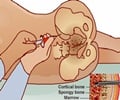Independent experts have failed to discover ‘ethical alternative’ to embryonic stem cells.

These cells have been touted by the New York-based company as an ethical alternative to stem cells requiring the destruction of human embryos, with the same regenerative ability to transform into other cell types in the body.
Earlier this year, NeoStem announced plans to launch the first human trials of the cells for bone growth.
"We tried as hard as we could to replicate the original published results using the methods described and were unable to detect these cells in either the bone marrow or the blood of laboratory mice," said lead author Irving Weissman, who directs Stanford's Institute for Stem Cell Biology and Regenerative Medicine.
Weissman's study is the first to evaluate the biological potency of the cells, and it found they could not transform into blood cells and contained very little DNA.
Instead, researchers found that what purported to be VSELs -- about five micrometers in diameter -- were either debris or dead cells.
Advertisement
In response, NeoStem chairman and CEO Robin Smith said the company has studies in progress that will "confirm whether or not VSEL(s) have characteristics of a pluripotent stem cell."
Advertisement
The cells were first described in 2006 by researchers working with lab mice at the University of Louisville in Kentucky.
Lead author of that first study to describe VSELs, Mariusz Ratajczak, told the journal Cell Stem Cell, in the edition coming out August 1, that he was anxious about the pace.
"I'm a little bit scared because I know that NeoStem would like to go fast to the clinic," he was quoted as saying. "I still think we need to do more basic research."
NeoStem has about 20 patent applications that protect the method for isolating the cells.
The company along with other partner institutions have also received $4.5 million in government research grants, including from the Department of Defense and the National Institutes of Health.
In 2010, it partnered with the Vatican on a charity to promote awareness of alternatives to embryonic stem cell research.
"Your own adult stem cells are the perfect ethical and moral alternative to stem cells derived from other donors or from embryonic stem cells," NeoStem says on its website.
According to Ihor Lemischka, professor of regenerative biology and director of the Black Family Stem Cell Institute at The Mount Sinai Medical Center in New York, the money spent on VSEL research was a "waste of funding."
"My impression is that this has been a controversial issue since the VSEL cells were first described," said Lemischka, who was not involved with the research.
"It is good that the Weissman laboratory, one of the most prominent stem cell labs in the world, has addressed these issues," he told AFP.
"Optimistically, the issue could now be well on the way to being settled," said Lemischka.
Source-AFP










